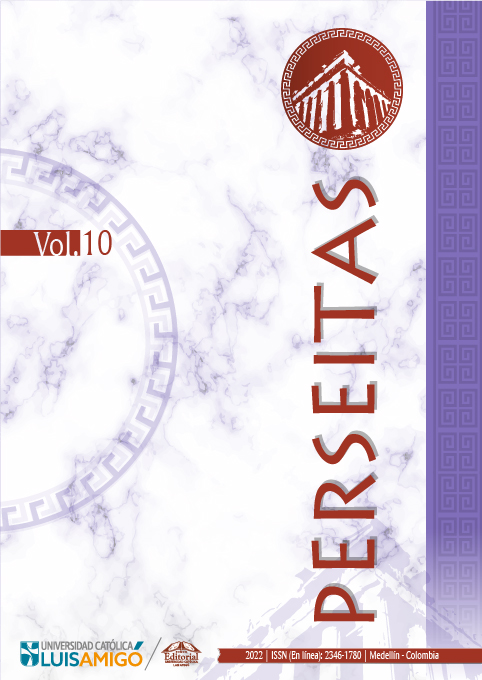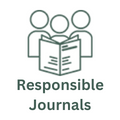I believe in God: a content analysis of the first article of Christian faith, based on a literature review
DOI:
https://doi.org/10.21501/23461780.4162Keywords:
Creed, God, Faith, Dogmatic theology, Latin American theology, TranscendenceAbstract
At present, there are different understandings of the first article of the content of the Christian faith, which makes an analysis of these interpretations from theological categories necessary. This research seeks to reveal the meaning of the first article of the content of the Christian faith in recent theological production, through a hermeneutical exercise, analyzing it bibliometrically and categorically and using the Nvivo software for the analysis of qualitative data as mediation.
It is concluded that recent theological literature addresses the meaning of the first article of the Christian faith from the existence, concept, definition of God and his attributes such as his power, performance, creation, revelation and reign. Although the material found is scarce compared to other topics or areas of knowledge that can be explored in these tools, the fact is explained because, normally, it has not been a concern for theologians to publish in high impact journals.
The approach to God in contemporary literature can be enriched by taking into account specific contexts such as poverty, discrimination, suffering, violence, human trafficking, migrants and political realities, among others, so that it is not only a metaphysical reflection of God, but also historical and immanent, and even with interreligious research that broadens the conception of the Christian God and responds to questions that contemporary society asks in their daily lives.
Downloads
References
Aguilar de Souza, J. C. (2004). Matrizes antropológicas para a compreensão do problema da natureza e da graça em Karl Rahner. Horizonte, 3(5), 131-141.
Alvarado Marambio, J. T. (2016) ¿Qué es una “religión”? Tres teorías recientes. Ilu. Revista de Ciencias de las Religiones, 21, 31–49. https://doi.org/10.5209/ILUR.53839
Alves de Souza Filho, E. (2016). God representation, Self-Representation, and Educational experience among University Students in Rio de Janeiro, Universitas Psychologica, 15(1), 361–382. https://doi.org/10.11144/Javeriana.upsy15-1.grsr
Bento XVI. (2010). Verbum Domini. Exortação apostólica pós-sinodal sobre a palavra de deus na vida e na missão da Igreja. Libreria Editrice Vaticana.
Biernot, D., & Lombaard, C. (2017). Religious experience in the current theological discussion and in the church pew. Theological Studies, 73(3), 1–12. http://dx.doi.org/10.4102/hts.v73i3.4347
Biris, I. (2018). On the logic the christian trinity: Co-inherence and the nesting relationships. Journal for the Study of Religions & Ideologies, 17(50), 17–29. http://jsri.ro/ojs/index.php/jsri/article/view/960/763
Cáceres, P. (2003). Análisis cualitativo de contenido: Una alternativa metodológica alcanzable. Psicoperspectivas, 2(1), 53–82.
Cifuentes Gil, R. M. (2011). Diseño de proyectos de investigación cualitativa. Noveduc.
Cortina, A. (2015). José Luis Aranguren. Religión pensada, religión vivida. Isegoría, (52), 167–185. https://doi.org/10.3989/isegoria.2015.052.07
Counted, V. (2015). Understanding God images and God concepts: Towards a pastoral hermeneutics of the God attachment experience. Verbum et Ecclesia, 36(1), 1–14.
Da Costa, R., & Silveira, S. (2015). “Como Deus é ciente em sua essência divina”: a Presciência de Deus em Santo Tomás de Aquino e no Livro da Contemplação (C. 1271-1273) de Ramon Llull. Trans/Form/Ação, 38(2), 9–34. https://doi.org/10.1590/S0101-31732015000200002
Darlington, V. (2016). From Theology to Theologies. Black Theology, 14(2), 152–168. https://doi.org/10.1080/14769948.2016.1185849
Ducay, A., & González-Alonso, P. (2016). La fórmula «pro multis»: Perspectiva bíblica y dogmática. Scripta Theologica, 48(3), 753–771. https://doi.org/10.15581/006.48.3.753-771
Falade, B. A., & Bauer, M. W. (2018). “I have faith in science and in God’’: Common sense, cognitive polyphasia and attitudes to science in Nigeria. Public Understanding of Science, 27(1), 29–46. https://doi.org/10.1177%2F0963662517690293
Filtvedt, O. J. (2017). The Transcendence and Visibility of the Father in the Gospel of John. Zeitschrift für die neutestamentliche Wissenschaft, 108(1), 90–118. https://doi.org/10.1515/znw-2017-0003
Francisco. (2013). Lumen Fidei. Carta encíclica sobre a fé. Libreria Editrice Vaticana.
Freire da Silva, M. (2015). Trindade e apofatismo no pensamento de Gregório de Nissa. Atualidade Teológica, 19(50), 330–351.
Gadamer, H.-G. (2004). Verdad y método. Sígueme.
García Rubio, A. (2011). A Visão Científica Evolucionista Interpela a Fé em Deus Criador. Atualidade Teológica, 15(37), 47–65. https://doi.org/10.17771/PUCRio.ATeo.18911
Gutiérrez, G. (2000). Teologia da libertação. Perspectivas. Edições Loyola.
Heidegger, M. (2009). Ser y tiempo. Trotta.
Leite, F. R. (2016). Um Argumento a Favor da Existência de Deus Formulado por Pierre Duhem. Trans/Form/Ação, 39(4), 33–58. https://doi.org/10.1590/S0101-31732016000400003
Muis, J. (2016). Rethinking the creative power of God. Theological Studies, 72(4), 1–7.
Müller, G. (1998). Dogmática. Herder.
Müller, G. L. C. (2015). Al Dios cristiano desde el ateísmo moderno. Teología y vida, 56(4), 461–469. https://doi.org/10.4067/S0049-34492015000400005
Múnera, J. C. (2016). De Apologética Trinitaria al Diálogo Interreligioso. Teología y vida, 57(1), 95–115. https://doi.org/10.4067/S0049-34492016000100004
Niño de Zepeda Gumucio, R. (2015). Fe y cultura en las reflexiones teológicas de Comblin, Scannone y Trigo: Convergencias y diferencias. Veritas, (33), 183–201. http://dx.doi.org/10.4067/S0718-92732015000200010
Ortega Cabrera, A. (2016). Pensamiento social desde la antropología y ética en perspectiva teológica: Claves para la pedagogía en el humanismo-valores de la doctrina social de la iglesia. Cauriensia. Revista Anual de Ciencias Eclesiásticas, 11, 757–768.
Pellegrino, L. (2017). Las historias de vida en el método de planificación pastoral ver-juzgar-actuar Veritas, (36), 113–133. http://dx.doi.org/10.4067/S0718-92732017000100006
Pié i Ninot, S. (1996). Tratado de teología fundamental. Secretariado Trinitario.
Ponzio, P. (2015). La experiencia como paradigma del nexo entre el hombre y Dios. Pensamiento Revista de Investigación e Información Filosófica, 71(266), 413–424. https://doi.org/10.14422/pen.v71.i266.y2015.009
Rahner, K. (1979). Curso fundamental sobre la fe. Herder.
Ramos González, A. (2016). Ateísmo y espiritualidad. Ilu. Revista de Ciencias de las Religiones, 21, 165–183. https://doi.org/10.5209/ILUR.53851
Ramos, C. A. (2015). Los paradigmas de la investigación científica. Avances en psicología, 23(1), 9–17. https://doi.org/10.33539/avpsicol.2015.v23n1.167
Rúa Penagos, J. A., & Toro Jaramillo, I. D. (2020). I believe in God: Content analysis of the first article of the Christian faith, based on a literature review. HTS Teologiese Studies / Theological Studies, 76(1), a7470. https://doi.org/10.4102/hts.v76i1.5470
Rúa Penagos, J. A., & Toro Jaramillo, I. D. (2020b). Words about God in the Peripheral Communities of Medellín. Verbum et Eclessia, 41(1), a2072.
Rúa Penagos, J.A. (2015). Teología del deporte. Fondo Editorial Funlam.
Sala, R. (2016). Monseñor Romero y la escatología de Gaudium et Spes. Teología y vida, 57(2), 185–209. http://dx.doi.org/10.4067/S0049-34492016000200002
Sarot, M. (2016). Believing in God the Father: Interpreting a phrase from the Apostle’s Creed. Theological Studies, 72(4), 1–4. http://dx.doi.org/10.4102/hts.v72i4.3287
Schickendantz, C. (2016). Un cambio en la ratio fidei: Asociación (aparentemente ilícita) entre principios teológicos y datos empíricos. Teología y vida, 57(2), 157–184. http://dx.doi.org/10.4067/S0049-34492016000200001
Schillebeeckx, E. (1965). Cristo, sacramento del encuentro con Dios. Dinor.
Souza, I. (2012). Reflexão cristológico-trinitária. Atualidade Teológica, 16(40), 72–86. https://doi.org/10.17771/PUCRio.ATeo.21636
Stratton, T., & Erasmus, J. (2018). Divine Determinism and the Problem of Hell. Perichoresis, 16(2), 3–15. https://doi.org/10.2478/perc-2018-0007
Strauss, A., & Corbin, J. (2002). Bases de la investigación cualitativa. Técnicas y procedimientos para desarrollar la teoría fundamentada. Editorial Universidad de Antioquia.
Tillich, P. (1972). Teología sistemática. Ariel.
Torrijos Castrillejo, D. (2017). ¿Dios con o sin el ser? Apuntes acerca de la onto-teo-logía. Espíritu, 66(153), 71–86.
Valenzuela A., E. (2015). Kerigma: preguntas teóricas en torno a la primera evangelización de América (Antillas, 1510-Nueva España, 1524). Historia Crítica, (58), 13–32. https://doi.org/10.7440/histcrit58.2015.01
Vitor de Oliveira, I. (2010). Deus: metafísica e pensar pós-metafísico. Horizonte, 8(16), 8–11. https://doi.org/10.5752/P.2175-5841.2010v8n16p8
Zapata Restrepo, N., & Schnitter, M. (2020). Adolescencia y deprivación afectiva: apuntes para la intervención. En Zapata-Restrepo, N., Ibarra, D., Garzón, D. Clínica psicodinámica: Aportes al razonamiento clínico y a la intervención psicoterapéutica (pp. 81-104). Editorial Bonaventuriana.
Zorroza, M. I. (2015). Trascendencia y apertura: Una imagen de hombre para nuestro tiempo. Cauriensia, 10, 459–471. http://dx.medra.org/10.17398/1886-4945.10.459
Published
How to Cite
Issue
Section
License

This work is licensed under a Creative Commons Attribution-NonCommercial-NoDerivatives 4.0 International License.
La revista y los textos individuales que en esta se divulgan están protegidos por las leyes de copyright y por los términos y condiciones de la Licencia Creative Commons Atribución-No Comercial-Sin Derivar 4.0 Internacional.

















